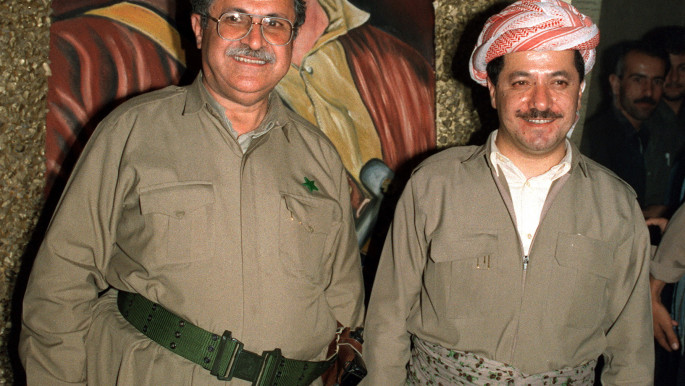Paul Iddon is a freelance journalist based in Erbil, Iraqi Kurdistan, who writes about Middle East affairs.
Follow him on Twitter: @pauliddon
"Talabani was like the sun with gravity force in the galaxy of Iraqi politics that kept balance among all competing, diverging and antagonistic political rivalries and ideologies," Saeed told The New Arab. "His departure in 2012 from Iraq's political scene upset the balance - as evidenced by former prime minister Nouri al-Maliki's actions towards Kurds and Sunnis."
'Mam Jalal'
Known affectionally as "Mam Jalal" (Uncle Jalal) among Kurds, Talabani fought the regime of Saddam Hussein for years in the mountains of Kurdistan. When Saddam was deposed he made history by becoming president of Iraq, preaching reconciliation and strenuously seeking to make a federal and inclusive Iraq a reality.
"Although the presidency is highly ceremonial with almost no power per the Iraqi constitution, Talabani's charisma, diplomacy, mediating and negotiating skills and background coming from a rebel leader to the most senior post in Iraq nevertheless won him respect and admiration even among them who did not like him or agree with his politics," Saeed said.
 |
In death, Talabani may yet bring Baghdad and foreign nations working to reprimand the KRG for holding the referendum, back to talks to resolve the current crisis |  |
The respect and tributes from Erbil, Baghdad and regional countries upon his passing attest to this. Saeed wonders if, in death, Talabani may yet bring Baghdad and foreign nations working to reprimand the KRG for holding the referendum, back to talks to resolve the current crisis.
If Iraq politicians, including Prime Minister Haider al-Abadi, actually visit Kurdistan to attend his funeral there's a possibility, Saeed says, that "his death will bring together Iraqi and Kurdish leaders" in dialogue. While this remains to be seen it would be a true testament to his legacy.
Kurdish President Masoud Barzani, whose Kurdistan Democratic Party (KDP) fought a civil war against Talabani's PUK in the mid-1990s, last month visited Sulaimania, the main PUK-supporting city in Kurdistan, and lamented the fact Talabani was no longer in politics.
Read more: Mam Jamal Talabani: Titan's death leaves Iraq's Kurdistan in a quandary
"[The] mission to achieve the nation's long-held quest for independence," Barzani declared, "would have been easier if Talabani was in better health."
 |
|
| Even long-time political rival Masoud Barzani [R] lamented the absence of Jalal Talabani [L] from politics [AFP] |
Following Talabani's death, Barzani gave his condolences: "The loss of a leader like Mam Jalal is a great loss to our nation and [his place] cannot be filled easily."
The Kurdish president subsequently declared a week of mourning across the Kurdistan region.
A personable president
Talabani was known for his quick wit and sense of humour, even at his own expense.
He once recalled Saddam Hussein's Foreign Minister Tariq Aziz cruelly telling him that the Kurdish people would only have the right to weep over their prized city of Kirkuk, from which Saddam was deporting Kurds and forcibly settling Arabs, as they passed through it.
Talabani sarcastically responded, in reference to the Shia 'Mourning of Muharram', saying: "This is very generous of you, for weeping is a right you deny the Shia."
A joke about Talabani that was quite popular in Kurdistan in the mid-2000s concerned a man inviting Talabani, who he didn't know, for a drink. After one glass the man asked Talabani who he was, to which Talabani revealed he was the president of Iraq. The man laughed in disbelief, saying "after one drink, Talabani is the Iraqi president - and after the second he'll be George W Bush!"
Talabani was often described as a gregarious man. Foreign visitors to his presidency were often amused that he cooked for them himself in his private residence. The late Arab academic Fouad Ajami once described Talabani's home as "elegant but within the bounds of taste".
Even at the height of his power, Talabani never forgot his roots. A Kurdish journalist friend of mine once told me of an occasion when, as president of Iraq, several journalists gathered round him, eager to ask questions. His bodyguards initially kept them back.
Talabani instructed his guards to allow them to ask what they liked, noting that, during the days of the Kurdish insurgency against Saddam, the Kurds were happy if they could receive one journalist to document their plight. Now they had several coming to Kurdistan and shouldn't be in anyway ungrateful of that fact.
Talabani's passing, coming as it does so close to the independence referendum, may well be the end of an era, given his championing of a successful unified Iraq, which is now very much in question. What is clear is that the Iraqis and the Kurds lost a very respectable man, something upon which they both can surely agree.
Paul Iddon is a freelance journalist based in Erbil, Iraqi Kurdistan, who writes about Middle East affairs.
Follow him on Twitter: @pauliddon